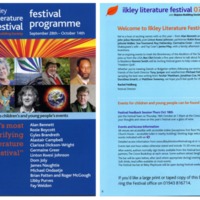
Ilkley Literature Festival, 2007
A number of events to mark the bicentenary of the Abolition Act of 1807 took place as part of Ilkley Literature Festival in 2007. Authors Caryl Phillips and Ben Okri discussed their work, and writers from the Peepal Tree Press Freedom Project premiered their poetry. 2007 Poet in Residence Rommi Smith invited festival goers to help create a unique literary 'Freedom Quilt', and gave a multi-media performance drawing on her recent visit to the Gambia. Street theatre was provided by performances of Sugar Beat Skank by Regeyshun Dance and the Leeds Bi-centenary Transformation Project. Members of the Leeds Diasporian Stories Research Group shared new material uncovered in the course of their research into the links between Yorkshire and the Atlantic trading world, and actor Joe Williams performed and answered questions as the African abolitionist Olaudah Equiano.
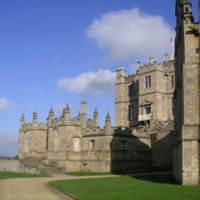
Slavery and the British Country House
In 2007 English Heritage (now Historic England) commissioned research into the linkages between properties in its care and transatlantic slavery, to coincide with events to commemorate the bicentenary. A report produced by historian Miranda Kaufmann identified 26 properties with some level of connection to slavery or abolition. As a result, more detailed surveys of four sites - Bolsover Castle, Brodsworth Hall, Marble Hill and Northington Grange - were commissioned in 2008, and the findings presented at the 'Slavery and the British Country House: mapping the current research' conference in 2009. The conference was organised by English Heritage in partnership with the University of the West of England, the National Trust and the Economic History Society. Findings were later published in 'Slavery and the British Country House' (2013), edited by Madge Dresser and Andrew Hann. The publication and the 2008 reports are available to download from Historic England's website.
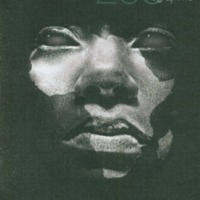
2007 Bicentenary for the Abolition of the Slave Trade Act at the National Maritime Museum
The National Maritime Museum marked the bicentenary with a range of initiatives and events including a new exhibition, a film season, poetry, music, debates, and new publications. A new permanent gallery opened at the museum in winter 2007 exploring Britain's Atlantic empire. A catalogue of slavery-related images, artefacts and documents from the collections of the museum, 'Representing Slavery', was published. The museum also devised a transatlantic slavery trail around Greenwich.
The National Maritime Museum hosted a number of events throughout 2007. The theme of the weekend 23-25 March was 'And still I rise', marked with a series of activities, performances and discussion. On August 23, International Day for the Remembrance of the Slave Trade and its Abolition, the ‘Freedom Festival: Contemporary Commemoration’ event saw a programme of creative events and performances exploring themes around the heritage of enslavement. The museum also offered a range of learning experiences based on its collections. For example, in November, a study session, 'Roots of Resistance: Abolition 1807' examined the roots of resistance and the abolition movement through talks by curators and contemporary artists. Activities for families were based on themes of freedom and carnival. 'The Big Conversation 2007' was a programme of debate and showcasing of diverse projects undertaken by students around the country, organised by the Understanding Slavery Initiative and the Department for Children, Schools and Families.
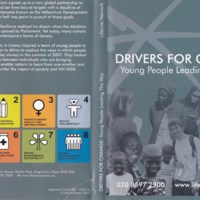
Drivers for Change: Young People Leading the Way
Drivers for Change was a project led by LifeLine Network, a network of partnerships between community organisations and NGOs with a common aim to fight poverty. In Summer 2007, a team of young people visited Zimbabwe, Sierra Leone and Dominica to explore the ways in which people were combating modern slavery. The trip was inspired by two significant points in history: the 1807 Abolition Act, and the half way point of the Millennium Development Goals, for which 189 nations signed up to a new global partnership to reduce extreme poverty. While in Africa, the group looked at how global partnerships between individuals bring communities together, and assist in countering the impact of poverty and HIV/AIDS. A film was produced documenting the trip, launched at an event was held at the Palace of Westminster.
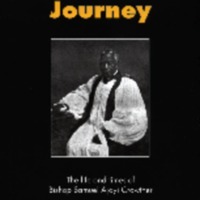
Crowther's Journey: The life and times of Bishop Samuel Ajayi Crowther
Southwark Pensioners Centre Black History Group led a project to explore the life of Bishop Samuel Ajayi Crowther. Born in Yorubaland, Nigeria, kidnapped and sold into slavery, Crowther became the Anglican church's first African-born bishop and an influential missionary in West Africa. The Crowther's Journey project involved weekly research and discussion sessions and visits to places of significance, such as the church of St Mary in Islington, where Crowther was ordained. This booklet focuses on the responses and reflections of members of the group on Crowther, his life and his legacy.
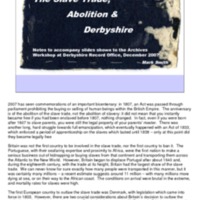
Derbyshire Slavery Project
A community project organised by SOS Immigration, a support organisation for asylum seekers and refugees based in Derby. In December 2007, Derbyshire Record Office held workshops for volunteers, designed to introduce archival and analysis skills when studying historical documents relating to slavery. The project’s aims were to co-ordinate research into links between Derbyshire and slavery, and to communicate the results to the public.
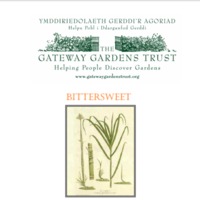
Bittersweet: Sugar, Spice, Tea and Slavery
The Bittersweet programme by the Gateway Gardens Trust involved 80 free guided garden visits over two years, around more than 30 gardens in Wales with a range of community groups, schoolchildren and lifelong learners. The themes of the visits and a mobile exhibition were the links between the slave trade and historic gardens, their makers, what they planted, Welsh abolitionists and the wider links with local communities in Wales. Historic gardens provided the starting point, looking at how everyday vegetables and fruits - beans, potatoes, tomatoes etc. - first reached the UK from the Americas. The project also looked at the history of afternoon tea, and the links between sugar, cotton and tea and slavery. The groups reflected on how many industries, grand houses and gardens were built from wealth linked to slavery, such as Cyfarthfa Ironworks in Merthyr and the expansion of the slate industry at Penrhyn Quarry. Early 18th century-style newspapers were produced, aimed at schoolchildren and adults.
Gardens involved included Cardiff’s Bute Park, Swansea’s Singleton Park, the National Botanic Garden in Carmarthen, Gwydir Castle in Llanrwst, Dyffryn Gardens, Portmeirion, Penrhyn Castle, Picton Castle, Dinefwr Park and Castle and Aberglasney Gardens.
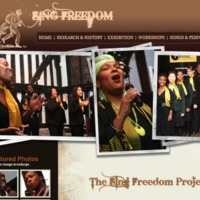
Sing Freedom
The Sing Freedom project was based on the Spirituals sung by African peoples as a response to being enslaved. The generally Christian songs often contained instructions about escape and resistance. The project was a collaboration between Kainé Management Group, Leicester African Caribbean Arts Forum, Leicester City Council Arts & Museum Service and Library Service. It included research into the songs, a touring exhibition, and performances. A series of song writing workshops for young people in partnership with BBC Radio Leicester aimed to give each participant an understanding of the effects of slavery and perceptions they have on present day freedom. At Leicester Guildhall Kainé Gospel Choir and friends came together for an evening celebrating the Spirituals, where songs such as The Gospel Train, Wade in the Water and Swing Low Sweet Chariot were sung.
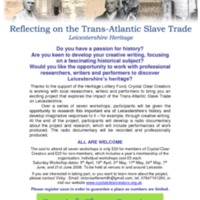
Reflecting on the Trans-Atlantic Slave Trade
Crystal Clear Creators is a not-for-profit arts organisation based in the East Midlands. Reflecting on the Trans-Atlantic Slave Trade enabled a series of community creative writing workshops in Leicester exploring themes of the slave trade. The workshops involved talks from experts in the field, a tour of relevant places of interest, and research at the Leicester, Leicestershire and Rutland Records Office. Those involved then wrote, produced, recorded and broadcast radio dramas on the subject, and held a day of performances for the public. The project was developed with Leicester's Arts forum LACAF and Mainstream Partnership. A follow-on project in 2009-10, Reflections: The Trans-Atlantic Slave-Trade, was a course for young people about the transatlantic slave trade, which included researching and writing about the subject. The project culminated in a day of performances and an exhibition at New Walk Museum.
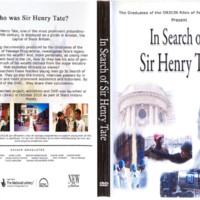
In Search of Henry Tate
A bust of Sir Henry Tate, one of the most prominent philanthropists of the 19th century, is displayed on a plinth in Brixton. A group of young men from the ORIGIN Rites of Passage Programme produced a documentary to investigate Tate's legacy and, in particular, the tensions inherent in his acts of generosity being funded by wealth derived from sugar production. The documentary featured interviews, research, and trips to Tate & Lyle plants and buildings. New Initiatives, a youth and community association, developed ORIGIN as an Africentric rites of passage programme, to support young men of African descent in their transition to adulthood. The project, exhibition and DVD was launched at Brixton Tate Library in October 2010.
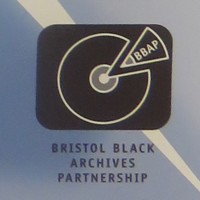
Bristol Black Archives Partnership
The Bristol Black Archives Partnership (BBAP) was set up to collect, protect and make available the heritage of Bristol's local black history. The partnership involved communities, heritage organisations and academic organisations coming together to collect and make accessible the archives - films, photographs, documents and objects - that reflected the experience and contribution of black people in Bristol. BBAP aimed to provide learning resources for a better understanding of Bristol's multicultural history: the 'Me, We, Making History' calendars celebrated local black achievers; 'My Legacy Journal' was made available for African-Caribbean people to record their own family identity, history and stories. A Black Bristolians Teaching Pack was produced, alongside a travelling exhibition based on the project's research entitled 'The Black Presence in Bristol - 16th Century to the Present Day'.
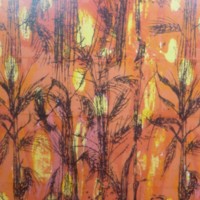
Trade and Empire: Remembering Slavery
The Whitworth Art Gallery was one of eight heritage bodies in the ‘Revealing Histories: Remembering Slavery’ partnership in Greater Manchester. The project set out to explore the history, impact and legacy of slavery on Britain through collections and community links in the North West.
'Trade and Empire: Remembering Slavery' explored the themes of trade and empire, commerce and collecting, and the impact of the experience of slavery and its legacy. Four invited artists and academics (SuAndi, Kevin Dalton-Johnson, Dr Emma Poulter and Dr Alan Rice) worked with Whitworth curators and learning staff to create the exhibition. It comprised of selections from the Whitworth's collections, contemporary works by Black artists, and objects on loan from Manchester Museum, John Rylands University Library Manchester, Bolton Museums and Archives Service and private collections. Areas of focus included a history of the Benin Bronzes, representations of Black people in British art, photographs of West Africa belonging to Tom Singleton Gardner, and printed textiles designed by Althea McNish. The exhibition was accompanied by a series of community engagement events.
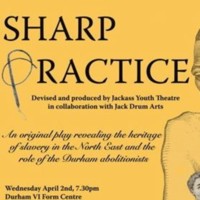
Sharp Practice
Inspired by archival research, ‘Sharp Practice’ was a touring play exploring the slave trade and the role of abolitionists from the North East of England in its demise (and, in particular, the work of Granville Sharp). The play was devised and produced by Jackass Youth Theatre, in collaboration with professional artists from Jack Drum Arts. Each performance was accompanied by an exhibition exploring the North East’s links to slavery and abolition, researched by members of the theatre group. Working with heritage professionals, their research took the performers to Newcastle, Hull, Liverpool, Gloucester, London and the University of Virginia.